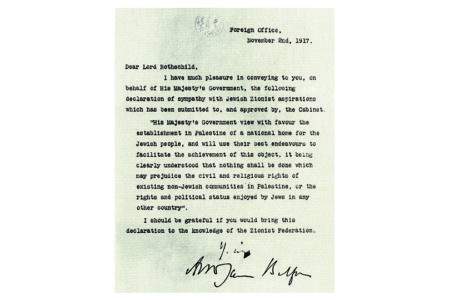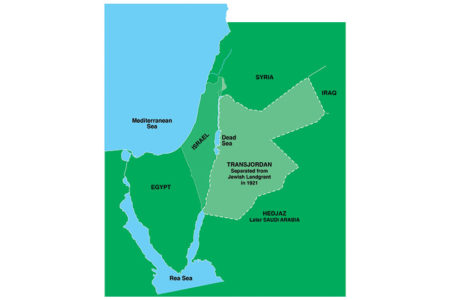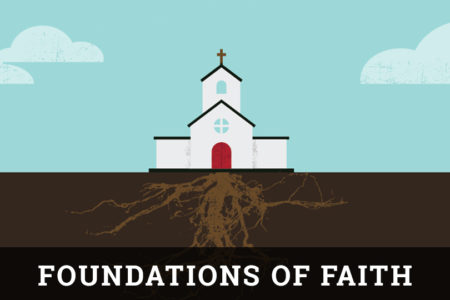Angel with a Little Scroll Revelation 10
There are a number of interludes throughout the judgment portions of Revelation. One is presented between the sixth and seventh seals in Revelation 7, and a second is presented between the sixth and seventh trumpets in Revelation 10:1–11:14. These interludes do not advance the chronology of Revelation, but they provide detailed information about other events taking place in relation to the seal, trumpet, and bowl judgments. Interludes also provide comfort to believers by showing God’s sovereign control over earthly events, His judgment of the wicked, and ultimate victory in His redemptive program for mankind and planet Earth. Chapter 10 centers on a mighty angel holding a little scroll. It is the beginning of a long interlude that leads to the seventh trumpet judgment.
The Angel’s Appearance
The scene in chapter 10 shifts from heaven to earth as John sees “another mighty angel come down from heaven” (v. 1). The apostle gives a vivid description of the angel’s appearance. First, he is “clothed with a cloud” (v. 1). Angels often ascend and descend on clouds. Clouds not only enhance the dignity and glorious appearance of angels but are often associated with angels and the Lord when they come on a mission of judgment. Nine of the twenty occurrences of clouds in the New Testament are connected with scenes of judgment (Mt. 24:30; 26:64; Mk. 13:26; 14:62; Lk. 21:27; Rev. 1:7; 14:14, 15, 16).*
Second, the angel has “a rainbow…upon his head” (v. 1). An emerald rainbow appeared earlier around God’s throne (4:3), but this is a multicolored rainbow worn as a headdress by the angel. The rainbow symbolizes God’s mercy, grace, and covenant promises in the midst of divine judgment (cp. Gen. 9:13).
Third, “his face was as though it were the sun” (v. 1). Like Christ (1:16), the angel’s face radiated glory and majesty. This is because he has been in the presence of God and is marked with delegated authority from God (cp. Ex. 34:29). Angels often radiate glory when they appear (Lk. 24:4; Rev. 18:1).
Fourth, “his feet [were] like pillars of fire” (v. 1). Fire throughout this book symbolizes judgment, and this angel’s mission is to announce God’s coming judgment. His “right foot [was] upon the sea, and his left foot on the earth” (v. 2), symbolizing the power and authority the angel has over the earth. The angel’s huge size and stance on both the sea and the earth, mentioned three times in this chapter (vv. 2, 5, 8), emphasize that God’s judgment will not be limited to a specific area but will be worldwide.
Fifth, “he had in his hand a little scroll open” (v. 2). The Greek word “scroll” (biblion) in Revelation 5:1 is different from the “little scroll” (biblaridion). This seems to distinguish the little scroll from the seven-sealed scroll of Revelation 5:1. Although the message in the little scroll is not stated, many theologians have speculated on its content. Because there are similarities between the two scrolls, some scholars believe that the little scroll should be identified with the earlier scroll as the title deed to the earth. Both scrolls are fully opened, and each is associated with a strong angel. But there is no indication that the little scroll represents the title deed to the earth. Others teach that the little scroll contains the prophecies mentioned in Revelation 12–22, whereas the seven-sealed scroll contains the prophecies of Revelation 1–11. This is not probable because the little scroll would have more content than the seven-sealed scroll, making it larger, not smaller. Also, the seven-sealed scroll contains all of the prophecies mentioned in Revelation 6–22. Still others teach that the little scroll contains the immediate contents of Revelation 11:1–13 because it is little and unrelated to the seven-sealed scroll. This position is too limited in scope. It would also have to be larger. The content of the little scroll, although not stated, must relate in some way to a portion of the seven-sealed scroll, the bitter prophecies of “the mystery of God [that] should be finished” (v. 7), and John’s commission to “prophesy again about many peoples, and nations, and tongues, and kings” (v. 11).*
Sixth, the angel “cried with a loud voice, as when a lion roareth” (v. 3). The volume and power of the angel’s cry were similar to a lion’s roar, which would command immediate attention and emphasize the importance of what is about to be said. In response to the angel’s cry, “seven thunders uttered their voices” (v. 3; cp. 4:5). The voices contain further revelation concerning the perfect judgment of God about to be manifested to the apostle.
John understood the revelation that was being articulated by the seven thunders because he was “about to write” (v. 4) what he heard. Instantly John “heard a voice from heaven saying…Seal up those things which the seven thunders uttered, and write them not” (v. 4). The voice is not identified, but in all likelihood it is the voice of God the Father or Jesus Christ instructing John not to write the revelation he is about to receive. This revelation was specifically for the apostle and not for the world. Speculation on this revelation is useless. Daniel (Dan. 12:9) and Paul (2 Cor. 12:4) had the same experience. John received more revelation concerning the future than he was permitted to reveal. What he wrote is exactly what God wanted mankind to know about the future. The revelation given to John, which he was not to reveal, must have prepared the apostle in some way for what was to follow that concerned God’s future program.
Who is the mighty angel described in the first four verses? The characteristics of this angel lead many commentators to say that he is Christ. Some do so on the basis of the Christophanies in the Old Testament, where Christ appeared as the angel of the Lord (Gen. 16:13; 24:7; 31:11, 13; Jud. 6:22). Others hold this position because of an earlier description of Christ in Revelation. This view is not tenable for a number of reasons. First, nowhere in Revelation is Christ identified as an angel; He is Lord over all the angels. Second, Christ was never called the angel of the Lord after He took on humanity. Third, this angel is described as “another mighty angel [of the same kind]” (v. 1), similar to the angel in Revelation 5:2. Fourth, this angel came “down from heaven” (v. 1), but there is no indication in Scripture that Christ will return to earth before His Second Coming. Fifth, it is evident that this angel cannot be Christ because he “swore by him that liveth forever and ever, who created heaven and the things that are in it, and the earth and the things that are in it, and the sea and the things which are in it” (v. 6). Christ, who is God, would not swear by God. This view has the angel (Christ) swearing by God, implying that God is greater than the angel (Christ).* Christ, who is God, would not swear by God. Sixth, some identify this angel as Gabriel or Michael. This is highly unlikely because no name is given to the angel. Seventh, others identify him with the “strong angel” of Revelation 5:2 because he speaks with a loud voice. Again, it is doubtful that this is the same angel. Although this angel is similar to other angels mentioned in Revelation, there is little evidence that he has been previously revealed.
The Angel’s Affirmation
John saw the strong angel “standing upon the sea and upon the earth [who] lifted up his hand to heaven” (v. 5). The purpose was to take a solemn oath. The angel “swore by him that liveth forever and ever, who created heaven and the things that are in it, and the earth and the things that are in it, and the sea and the things which are in it” (v. 6). God, who has created all things in the earth and sovereignly controls His creation, has the divine prerogative and authority to control the time of its destruction.
The angel announced “that there should be delay no longer” (v. 6). The word “delay” is sometimes rendered “time.” This cannot be referring to the end of time and the beginning of eternity because the thousand-year reign of Christ has not been announced (see Rev. 20), and it must be lived out before the beginning of the eternal state. In other words, “it does not refer to time as a succession of chronological events, rather, it means that time has run out, that is, that there will be no further delay”* in the unveiling and fulfillment of “the mystery of God” (v. 7). “The mystery of God” refers to hidden truth concerning God’s program that is about to be divinely revealed through John. This hidden truth deals with the coming bowl judgments, which will be poured out with the blowing of the seventh trumpet, as well as all of the events yet to be revealed concerning the institution of the millennial kingdom and the new heaven and new earth. In other words, there should be no delay in revealing the remainder of God’s program; it “should be finished” (v. 7) or brought to completion.
The Apostle’s Assignment
God spoke again from heaven instructing John to “Go and take the little scroll which is open in the hand of the angel who standeth upon the sea and upon the earth” (v. 8). This is the third time in this chapter that the angel is identified as the one standing “upon the sea and upon the earth” (cp. vv. 2, 5), indicating his complete power over planet Earth to carry out God’s revealed program.
John said to the angel, “Give me the little scroll” (v. 9), in obedience to God’s command. The angel complied but instructed John to “eat” (v. 9) the scroll. The apostle said, “I took the little scroll out of the angel’s hand, and ate it up, and it was in my mouth sweet as honey, and as soon as I had eaten it my belly was bitter” (v. 10). Eating suggests devouring and digesting the knowledge of the contents of the little scroll’s revelation. The revelation concerning future events was sweet to John’s taste, but when he digested its message it was bitter or sharp in his stomach. Both Ezekiel (Ezek. 2:9–10; 3:1–4) and Jeremiah (Jer. 15:16–18) had the same experience when they received God’s message. Often the Word of God is sweet to the taste or pleasant to the ears, but its message, once understood, can produce pain and anguish in the soul. God’s Word is a two-edged sword. It contains the sweet message of deliverance to believers and the bitter message of judgment and damnation to unbelievers (Heb. 4:12).*
Upon digesting the scroll, John is instructed to “prophesy again about many peoples, and nations, and tongues, and kings” (v. 11). The apostle is commissioned to reveal the scroll’s contents to the world. John has no choice; he “must” obey the directive of God’s will and faithfully minister the revelation. This commission to reveal the future is not new to John, for he is to “prophesy again” (cp. 1:19).
The subject of John’s future pronouncement involves four groups. These groups are the objects of the prophecy, not the audience. First, the “many people” include the other three categories but indicate that the scope of John’s prophecy will extend far beyond his geographical sphere to include the masses of mankind. Second, it will be directed specifically to the “nations” that is, the Gentile world separated by national boundaries, laws, and traditions. Third, it will go to those people who are divided by “tongues” or languages. Fourth, the prophecies yet to be pronounced will have a special focus and message to specific “kings” throughout the world (cp. 16:14; 17:10, 12; 18:9).
Like John, believers must devour and digest the content of Revelation in order to send a warning to a lost world concerning future events. To those who reject the message in unbelief, it will be forever bitter, producing anguish and fear. To those who heed the message and put their faith in Christ, God’s Word will be forever sweet.








Is it possible the little scroll is the scroll of Jeremiah 51:60
When the prophecies of judgement for mystery Babylon is to be revealed? Or poured out?